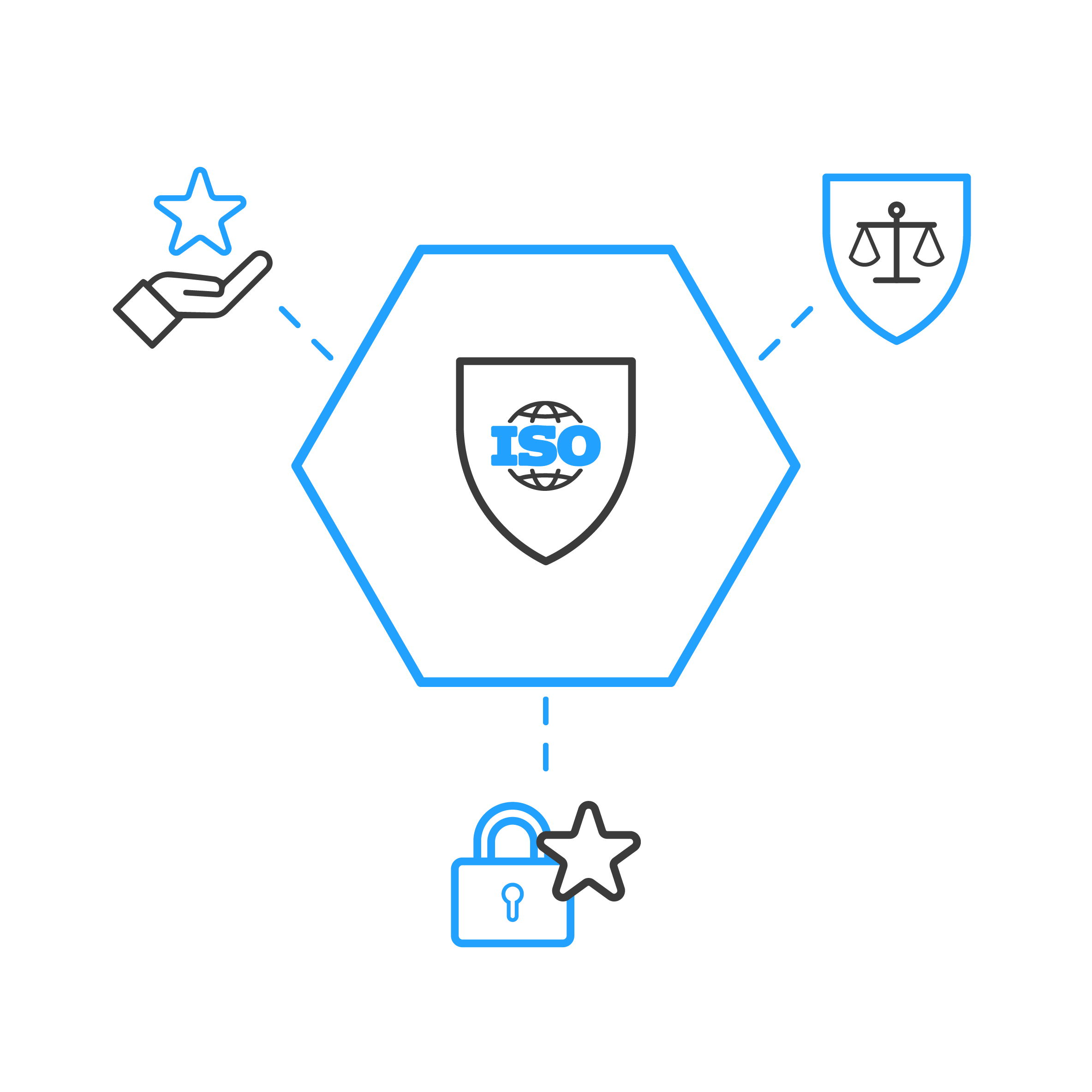
The international standard ISO 22301 – Business Continuity Management Systems (BCMS) – provides the framework to identify threats, prepare response strategies and recover quickly. It elevates continuity from an IT issue to a board-level strategic imperative.
Consultancy Services
ISO 22301
YOUR CHALLENGES
High Risk of Supply-Chain Disruption
A single supplier failure, transport delay, or geopolitical event can interrupt production, delay service delivery, or impact customer confidence.
Many organisations struggle to identify single points of failure, map dependencies, and develop continuity plans that ensure critical materials and partners remain operational in a crisis.
Alignment With Regulatory Frameworks
Regulators and clients are increasingly demanding proof of operational resilience.
However, aligning existing policies and processes with diverse frameworks - such as ISO standards - can be overwhelming.
Organisations often face gaps between regulatory expectations and current capabilities.
Maintaining Critical Services Operations
Unplanned disruptions - whether from IT outages, cyber incidents, or workforce unavailability, can bring essential services to a standstill.
Maintaining operations during crises requires tested continuity strategies, clear recovery objectives, and defined roles for every part of the business.

What is ISO 22301?
ISO 22301 is the international standard for Business Continuity Management Systems (BCMS). It provides a structured framework that enables organisations to prepare for, respond to, and recover from disruptive incidents - whether those arise from natural disasters, cyber attacks, supply chain failures, or internal system breakdowns.
At its core, ISO 22301 guides organisations to plan, establish, implement, operate, monitor, review, and continually improve a comprehensive business continuity management system.
This framework ensures that critical operations can continue with minimal interruption, even when unforeseen events occur. It supports proactive risk identification, clear recovery objectives, and robust response capabilities that protect your people, assets, and reputation.
Implementing ISO 22301 isn’t just about meeting audit requirements. It’s about embedding resilience into the organisation’s culture and strategy. A certified BCMS demonstrates to customers, regulators, and stakeholders that your organisation can withstand disruptions and deliver essential services under pressure.
Why is the ISO 22301
certification valuable?
Operational Resilience
ISO 22301 helps identify critical processes and risks, ensuring essential functions continue during disruptions and minimising downtime.
Regulatory Compliance
The standard aligns your continuity practices with international and industry regulations, simplifying audits and reducing compliance risks.
Stakeholder Assurance
Certification demonstrates reliability and preparedness, strengthening trust with customers, partners, and investors.

ISO 22301 In Practice
The Challenge
A mid-sized industrial supplier struggled with unpredictable supply chain disruptions and gaps in regulatory compliance. Previous incidents had led to production delays, customer dissatisfaction, and reactive responses to crises. Without a formal continuity framework, there was a real risk of financial loss and reputational damage during future disruptions.
The Solution
ISO 22301 offered a Business Continuity Management System (BCMS) framework tailored to the organisation’s operations. The system identified risks, established recovery priorities, and clarified roles and responsibilities, enabling the company to plan proactively rather than reactively during incidents.
The Implementation
+ Risk assessment and business impact analysis: Identifying vulnerabilities and critical processes to prioritise continuity efforts.
+ Policy development and procedure design: Establishing formal strategies and procedures to manage disruptions effectively.
+ Staff training and awareness programmes: Ensuring all employees understood their roles and responsibilities in a continuity plan.
+ Monitoring, testing, and continual improvement: Regularly reviewing and updating the BCMS to maintain readiness and effectiveness.
The Results
+ Enhanced resilience: Critical services could continue operating during disruptions with minimal downtime.
+ Compliance assurance: Operations were aligned with relevant regulatory and industry standards, simplifying audits.
+ Improved stakeholder confidence: Customers, partners, and investors were reassured of the organisation’s preparedness and reliability.
+ Operational efficiency: Streamlined processes and clear continuity procedures reduced duplication, confusion, and response times during incidents.
In Conclusion
ISO 22301 transformed business continuity from a reactive process into a strategic capability. The organisation now manages risks proactively, maintains operational stability, and demonstrates resilience to stakeholders, securing both performance and reputation.

PureCyber’s ISO 22301 Consultation Service:
Real-world cyber-resilience expertise – Our team operates at the intersection of incident response, threat exposure and business continuity.
Vendor-agnostic, unified approach – Whether your continuity depends on IT, cloud, supply chain or people, we bring holistic coverage.
Tailored for your journey – Whether you’re building from scratch or refining an existing BCMS, we fit your size, sector and maturity level.
Board-level insight – We align continuity management with leadership decisions, risk appetite and regulatory demands.
UK-based support – All consultancy services are grounded in our Cardiff centre, ensuring consistent quality and accountability.
Contact PureCyber
Contact PureCyber to learn about ISO 22301 or our other consultancy services. We work with you to ensure robust information security and compliance.
ISO 22301 FAQs
-
The ISO 22301 standard is crucial for organisations to enhance their resilience against various unforeseen disruptions, ensuring continuity of operations and services. It helps in identifying risks, preparing for emergencies, and improving recovery time.
-
The ISO 22301 certification process ensures that an organisation has a robust Business Continuity Management System (BCMS) in place. It typically involves:
Scoping the BCMS: Defining the boundaries, objectives, and critical functions covered by the system.
Conducting a business impact analysis and risk assessment: Identifying potential threats, vulnerabilities, and critical processes that need protection.
Implementing continuity strategies and procedures: Developing plans, policies, and response measures to manage disruptions effectively.
Conducting internal audits: Reviewing the system to ensure it is effective, compliant, and ready for certification.
Undergoing an external audit by a certification body: A formal assessment to confirm the BCMS meets ISO 22301 requirements, leading to certification.
-
The time required to achieve ISO 22301 certification depends on the organisation’s size, complexity, and the maturity of existing business continuity practices. Typically, the process takes 6 to 12 months, covering scoping, risk assessments, plan development, staff training, internal audits, and the external certification audit. Organisations with well-established continuity processes may achieve certification more quickly.
-
Any organisation that relies on critical processes or services can benefit from ISO 22301 certification, regardless of size or industry. It is particularly important for sectors where disruptions can have significant operational, financial, or reputational impact, such as finance, healthcare, IT, utilities, and government services. Certification demonstrates a proactive approach to resilience and ensures the organisation can continue delivering essential services during unforeseen events.
-
Strong business continuity governance provides a structured approach to managing risks and ensuring critical processes remain operational during disruptions. Implementing a recognised framework such as ISO 22301 demonstrates to customers, partners, and regulators that your organisation takes resilience seriously.
Effective governance can also become a business enabler:
Opening new opportunities: Some contracts and frameworks require demonstrable continuity capabilities.
Building stakeholder confidence: Customers and partners gain assurance that essential services will continue under pressure.
Supporting compliance: Helps meet legal, regulatory, and contractual obligations related to operational resilience.
-
PureCyber provides end-to-end support for your ISO 22301 journey, guiding you from initial planning to full certification. We offer a dedicated consultancy resource who works with all areas of your organisation to implement effective business continuity practices and ensure compliance with the ISO 22301 standard.
We act as an extension of your team to help build, embed, and maintain your Business Continuity Management System (BCMS), covering key areas such as:
Policy and process implementation: Developing and documenting continuity plans, procedures, and governance frameworks.
Management review meetings: Ensuring senior leadership remains engaged in continuity oversight and decision-making.
Internal audits: Checking the effectiveness of your BCMS and identifying opportunities for improvement.
External audit support: Preparing for certification assessments and liaising with auditors.
PureCyber also provides guidance on business impact analysis, risk assessments, and recovery strategies, helping you create continuity controls that complement your existing processes rather than disrupt them.
With our support, you gain a structured, practical approach to business continuity that strengthens operational resilience, protects critical services, and reassures stakeholders.
Request an ISO 22301 Consultation
Independent Service
ISO 22301 can be requested as a standalone service or a one-off project.
During onboarding, our team reviews and customises the consultancy approach to meet your specific requirements.

-

Password Tip and Tricks
Adding the number ‘1’ at the end just isn’t going to cut it unfortunately…. Learn more about the basics to get started on the right foot.
-

South Wales Honorary Fellowship
The NIS2 Framework represents a critical evolution in the European Union’s cyber security legislation, expanding the scope and rigour of the original NIS Directive. Enforced on October 17, 2024, NIS2 imposes stringent security requirements on various organisations.
-

Is Your Software Supply Chain Your Biggest Cyber Risk?
As organisations move to a more cloud-based approach, the risk of supply chain attacks increases. Find out how you can check and reduce the risk of a supply chain attack on your organisation








